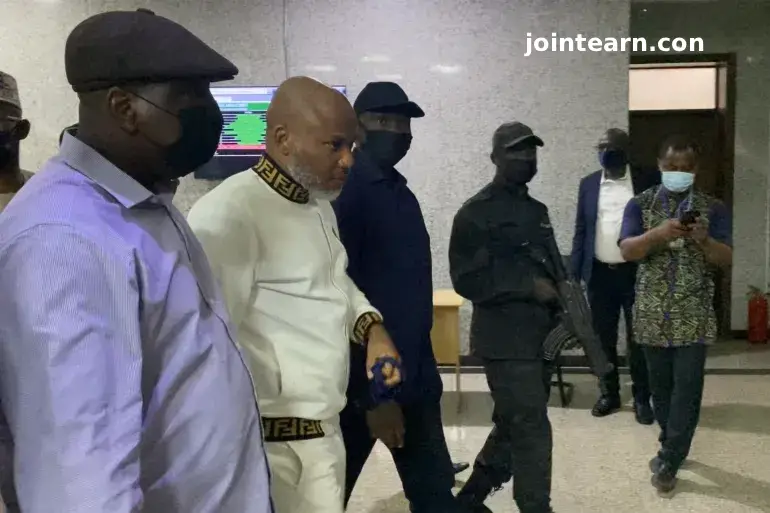
A Nigerian court has convicted Nnamdi Kanu, leader of the banned Indigenous People of Biafra (IPOB), on charges related to terrorism after a protracted legal battle spanning several years. The ruling comes as tensions over separatist movements in Nigeria’s southeast continue to simmer.
In his verdict on Thursday, Judge James Omotosho stated that prosecutors had successfully demonstrated that Kanu’s broadcasts and instructions via Radio Biafra incited deadly attacks on security forces and civilians in the Igbo-dominated southeastern region.
“His intention was quite clear, as he believed in violence. These threats of violence were nothing but terrorist acts,” the judge said.
Background: Nnamdi Kanu and IPOB
Kanu, who has been in custody since his controversial re-arrest in Kenya in 2021, has long advocated for an independent Biafra state, which would encompass Nigeria’s southeast. His movement, IPOB, has been banned by the Nigerian government due to its alleged role in violence and unrest.
Kanu has a history of radio broadcasts via his London-based Radio Biafra, established in 2009, which Nigerian authorities claim encouraged attacks on security personnel.
Kanu was first arrested in 2015 but fled while on bail. His extradition from Kenya in 2021 was challenged by his lawyers, who argued that it violated legal procedures and undermined his right to a fair trial. Kenya has denied allegations of mistreatment during the extradition process.
Charges and Legal Proceedings
Kanu faced seven charges, including terrorism, treason, and spreading falsehoods against Nigeria’s former President Muhammadu Buhari. Throughout his trial, he maintained his innocence and objected to the admissibility of statements made on Radio Biafra from London.
“I can’t see how someone would make a statement in London and it becomes a triable offence in this country,” said Kanu’s lawyer, Ifeanyi Ejiofor, during proceedings in 2021.
Despite these arguments, the Nigerian court ruled that his broadcasts and directives contributed to violent attacks in the southeast, thereby constituting terrorism under Nigerian law.
Historical Context: Biafra Separatism
IPOB seeks to carve out the southeastern region of Nigeria, predominantly inhabited by the Igbo ethnic group, as an independent state. The movement echoes the failed Biafra secession of 1967, which triggered a three-year civil war and claimed more than one million lives.
Kanu’s rhetoric, including statements expressing profound animosity toward Nigeria, has heightened concerns among government authorities about the resurgence of separatist violence in the region.
Implications and Reactions
The conviction of Nnamdi Kanu is likely to further polarize political and social dynamics in southeastern Nigeria. It underscores the Nigerian government’s firm stance against separatist movements and efforts to maintain national unity, while raising questions about human rights, extradition legality, and press freedom in politically sensitive cases.


Leave a Reply